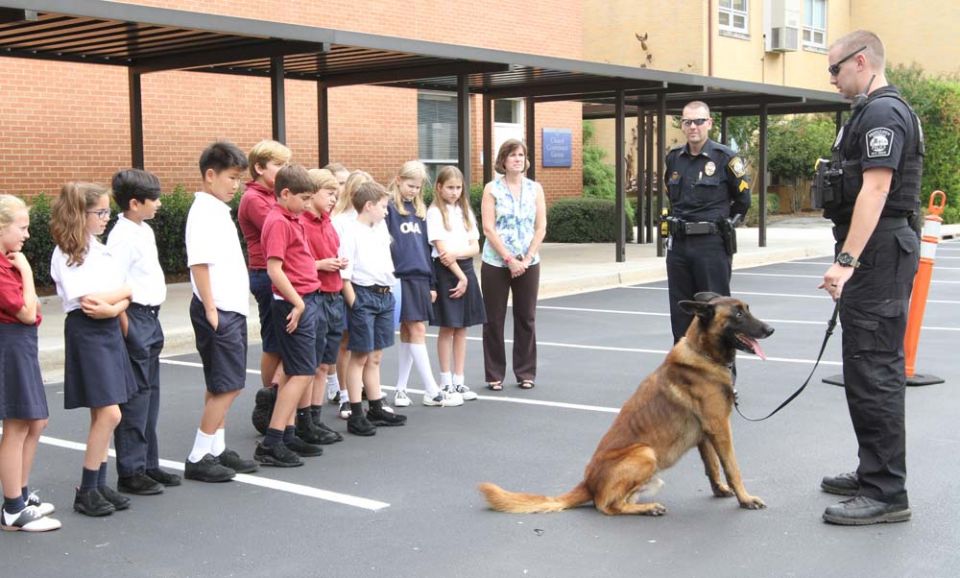20170927T1126-11895-CNS-PARISH-ADOPT-A-COP.jpg

ST. LEO, Fla.— Results from the St. Leo University Polling Institute in September show that a majority of Americans, over 56 percent, greatly trust their police departments and officers, while about one-fifth to one-quarter have little or no trust, according to an Oct. 9 press release by the university.
This is the third year the polling institute has asked these questions in its fall survey, which polls 1,000 Americans across the country. The survey has also found consistent strong support for police body cameras, with over 90 percent of respondents saying that they agree that police should wear them. White Americans tend to put greater faith in the police than their minority counterparts do; only about 44 percent of Hispanics and African-Americans give the police positive reviews. Americans 55 and older are also more likely to trust the police.
Less than half of Americans put strong levels of trust in the court system, and only one third of African-Americans do.
Over three years, the survey has also found a significant increase in support for Black Lives Matter in the last year. The movement, supported by only 38 percent of respondents in 2016, now has the support of over 50 percent.
"This may indicate an increase in support for the Black Lives Matter movement due to increased public visibility in social media and at the grassroots level," Moneque Walker-Pickett, an attorney and associate professor in the university's department of criminal justice, said in the press release. "After the 2016 election, the social environment has changed, becoming more supportive of social action and non-violent protest."
OTTOWA — The Sisters of Saint Ann, St. Joseph's Province, are gifting $800,000 to St. Paul University to establish capacity in counselling and spirituality by/for indigenous peoples, a first of its kind in Canada, according to an Oct. 5 press release by the university.
"In light of the United Nations Declaration on the Rights of Indigenous peoples and the report by the Truth and Reconciliation Commission, it is more important than ever that universities engage in dialogue with Indigenous peoples, as we have much to learn and do," Chantal Beauvais, St. Paul University rector, said in the press release. "This exceptional gift from the Sisters of Saint Ann, St. Joseph's Province, will help to establish a new capacity in our initiatives to serve the needs of Indigenous peoples."
The initiative will be developed along with First Nations University of Canada, Nipissing University and St. Mark's College, a Catholic seminary affiliated with the University of British Columbia.
According the press release, the objective of the initiative "is to train psychotherapists who will benefit from the full clinical rigour of current program offerings, while respecting and incorporating Indigenous cultural knowledge, values and spiritual teachings on a regional scale through community partnerships."
SAN FRANCISCO — The University of San Francisco's Swig Program in Jewish studies and social justice has been holding a celebration of Sukkot, the Jewish Feast of Tabernacles, this week, as Aaron Hahn Tapper, chair of the university's theology department and director of the Swig Program, explains in an interview with the university's news and media site.
The eight-day festival celebrates the harvest and the Exodus from Egypt.
Hahn Tapper also sees the celebration as an opportunity to discuss important social issues, like racial justice, the environment, immigration and mass incarceration.
"Traditionally, this holiday embodies the value of welcoming the other," he said in the interview. "For some this means sharing meals with people in the community inside a sukkah. But it can also be interpreted as a time to feed people's minds — a time to fill people's souls with ideas about social justice."
The Swig Program is a minor sequence of undergraduate studies that according to its webpage "examines Jewish culture, history, politics, philosophy, and language to better understand and strengthen marginalized communities around the globe."
Advertisement
Advertisement
ST. LOUIS— Fontbonne University has been awarded a $1.25 million grant from the federal government to train special education teachers, St. Louis Public Radio reported on Oct. 9. The grant will fund programs to promote the collaboration of speech pathologists and deaf educators. The government hopes the university can use the grant to help address the shortage of special education teachers in 46 states, including Missouri.
"St. Louis is a sort of rich educational setting for children who are deaf and hard-of-hearing who listen and talk," Jenna Voss, an assistant professor of deaf education at Fontbonne, told St. Louis Public Radio. "But where there are gaps are not as far as an hour outside of St. Louis in all directions," she said, citing the especially dire need for special education teachers in rural areas.
WASHINGTON — Two biology professors at the Catholic University of America have received grants from the National Institutes of Health totaling over $1 million, according to an Oct. 11 story on the university's news site.
John Golin has been studying the genetic and biochemical reasons that defects in cells can cause resistance to antibiotics and cancer treatments. Ann Corsi's research focuses on the molecular basis of genetic disorders that disrupt the development of embryos.
"The NIH wants research that makes a connection between science and health," Golin told the university's news site.
Together, the two professors have designed a sophomore laboratory course to train biology majors in research.
[James Dearie is an NCR Bertelsen intern. Contact him at jdearie@ncronline.org.]


